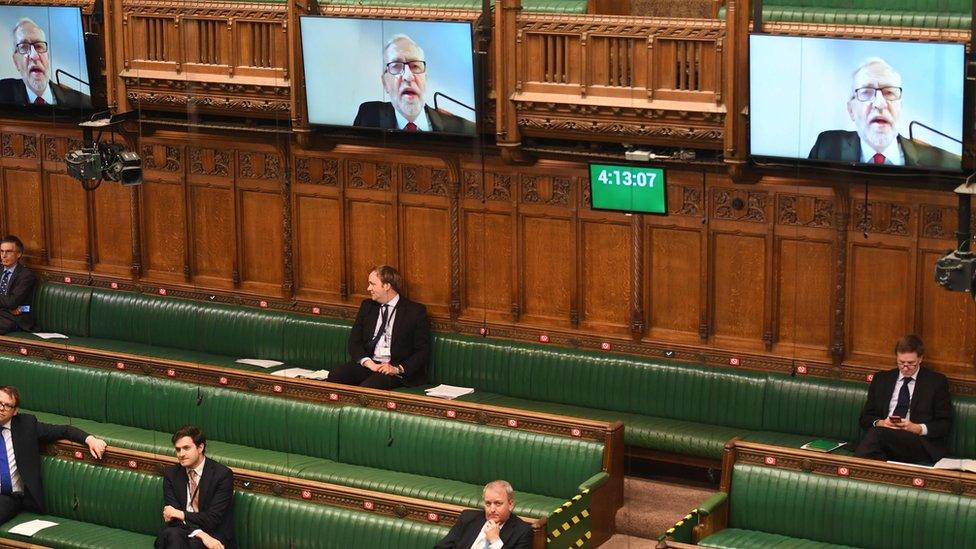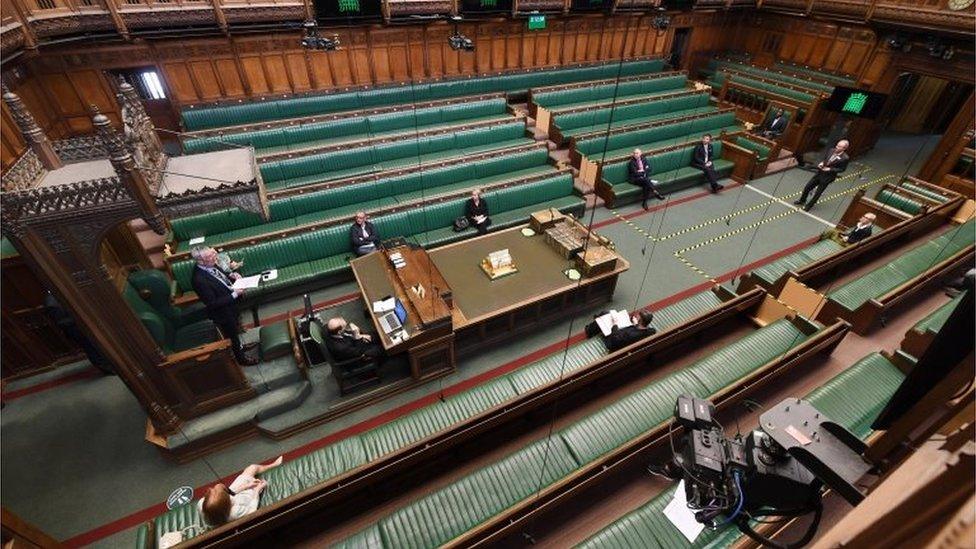MPs to vote on future of virtual Commons
- Published
- comments

MPs have been able to speak via video link during the coronavirus outbreak
MPs will vote on the future of virtual proceedings later, amid a row over how Commons business can take place safely.
The government says virtual tools allowing members to debate and vote digitally have been ineffective and will be "better done face-to-face".
But critics say the government plan will exclude vulnerable MPs and those with caring responsibilities.
MPs are now meeting to decide and will use a temporary voting process.
They will be asked to queue up outside the Commons chamber before entering in order to observe social distancing.
The cross-party Procedure Committee has tabled an amendment to the government's plan to enable the Commons Speaker to authorise electronic voting and allow MPs unable to get to the chamber to participate "digitally".
It has the support of the opposition, as well as some Conservative MPs.
The Equality and Human Rights Commission has joined calls to ensure MPs can work remotely, saying it would place MPs who are shielding or self-isolating because of age, disability, health conditions or pregnancy "at a significant disadvantage" if they can't.
The watchdog's chief executive, Rebecca Hilsenrath, added: "We urge the government to agree a revised proposal that upholds the principles of equality and human rights, and ensures the Parliament shows leadership to the rest of the country in inclusive workplaces, especially when the decisions which result affect us all."
'Democracy on hold'
Tory MP Henry Smith told BBC Breakfast virtual proceedings had "curtailed my ability on behalf of my constituents to scrutinise the government".
He added: "We can't put our system of democracy on hold forever, and as the rest of the country starts to unlock, I think it's only right that MPs should as well."
But Labour's shadow Commons leader, Valerie Vaz, told the same programme the government had put forward the proposals "without any chance for anyone to work out a proper solution", and there would be a "whole range of issues about a group of people travelling across the country" to get to Westminster, possibly spreading the virus.
Tory MP Robert Halfon, who has been shielding at home, also told BBC News scrapping virtual proceedings was "democratically unjust" for MPs who could not return to Parliament, leaving them as "parliamentary eunuchs".
He added: "This stern and unbending attitude of the powers that be is unfortunately why many people sometimes have problems with the Conservative Party."
And the SNP's Pete Wishart said he could not get from his rural constituency in Perthshire to London to participate, calling it an "utterly bizarre" decision by the government which risked "disenfranchising millions of people from across the United Kingdom".
The Speaker, Sir Lindsay Hoyle, has warned of the risk of "deadlock" over the government's plans, urging MPs to agree on a solution to allow all members to take part.
Robert Halfon: Government making MPs "Parliamentary eunuchs"
The so-called hybrid proceedings have been in place since mid-April.
The measures were initially due to end on 12 May, but MPs agreed to a motion from the government to extend them until 21 May - the start of the Whitsun recess.
In a letter to MPs, Sir Lindsay said the Commons now needed to decide how to conduct its business and its votes in the future, but this could only be done in person, because the previous "hybrid" arrangements have formally lapsed.
However, the usual practice of voting in corridors either side of the main chamber - the division lobbies - has been ruled unsafe by Public Health England, leaving the Commons in potential limbo as it returns from the Whitsun recess.
Sir Lindsay proposed an unprecedented process for the decision, in which MPs will have to queue at a two-metre distance from each other before slowly filing into the chamber to cast their vote.
He said any vote - which will see MPs start their journey in Westminster Hall, the oldest part of the Palace of Westminster - would take about half an hour.
Allow X content?
This article contains content provided by X. We ask for your permission before anything is loaded, as they may be using cookies and other technologies. You may want to read X’s cookie policy, external and privacy policy, external before accepting. To view this content choose ‘accept and continue’.

"I have had to devise a temporary way forward to break the deadlock - because the House must be able to have its say," he said.
"It is not perfect, it will take time, and members will need to be patient," he said. "But, it is the safest method I can think of to enable members and supporting staff to maintain social distancing."
The current set-up has seen a maximum of 50 MPs allowed in the Commons chamber, with up to 120 taking part via video conferencing technology.
'Much more effective'
But writing for the Politics Home website, external, Commons leader Jacob Rees-Mogg said the virtual set-up "is no longer necessary," and physical working would make the Commons "much more effective".
"Politics is better done face-to-face, even if the whites of the ministerial eyes are six feet away," he added.
He also said work was under way with Commons authorities to determine how MPs shielding at home or with health conditions "can safely continue to contribute".
It is understood the government sees the pairing convention, external - under which absent MPs from opposing parties have their votes cancelled out - as a way to account for MPs who are not able to vote in person.

A SIMPLE GUIDE: What are the symptoms?
RISK AT WORK: How exposed is your job?
HOW A VIRUS SPREADS: An explanation
RECOVERY: How long does it take to get better?

- Published1 June 2020
